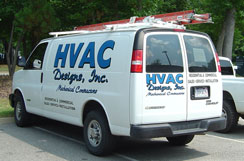 |
 |
Commercial HVAC Virginia Beach, VA
How Air Conditioners Work
Air conditioners employ the same operating principles and basic components
as your home refrigerator. Refrigerators use energy (usually electricity)
to transfer heat from the cool interior of the refrigerator to the
relatively warm surroundings of your home; likewise, an air conditioner
uses energy to transfer heat from the interior of your home to the
relatively warm outside environment.
An air conditioner cools your home with a cold indoor coil called
the evaporator. The condenser, a hot outdoor coil, releases the collected
heat outside. The evaporator and condenser coils are serpentine tubing
surrounded by aluminum fins. This tubing is usually made of copper.
A pump, called the compressor, moves a heat transfer fluid (or refrigerant)
between the evaporator and the condenser. The pump forces the refrigerant
through the circuit of tubing and fins in the coils.
The liquid refrigerant evaporates in the indoor evaporator coil,
pulling heat out of indoor air and thereby cooling your home. The
hot refrigerant gas is pumped outdoors into the condenser where it
reverts back to a liquid, giving up its heat to the outside air flowing
over the condenser's metal tubing and fins.
Throughout the second half of the 20th century, nearly all air conditioners
used chlorofluorocarbons (CFCs) as their refrigerant, but because
these chemicals are damaging to Earth's ozone layer, CFC production
stopped in the United States in 1995. Nearly all air conditioning
systems now employ halogenated chlorofluorocarbons (HCFCs) as a refrigerant,
but these are also being gradually phased out, with most production
and importing stopped by 2020 and all production and importing stopped
by 2030.
Production and importing of today's main refrigerant for home air
conditioners, HCFC-22 (also called R-22), will begin to be phased
out in 2010 and will stop entirely by 2020. However, HCFC-22 is expected
to be available for many years as it is recovered from old systems
that are taken out of service. As these refrigerants are phased out,
ozone-safe hydro fluorocarbons (HFCs) are expected to dominate the
market, as well as alternative refrigerants such as ammonia.
Click here for a free
confidential quotation
Or give us a call today at (757) 333-3114.
|
| |
 Commercial
& Residential HVAC Commercial
& Residential HVAC
Commercial & Residential Service Provider
in Virginia Beach, VA
|
|
|

